
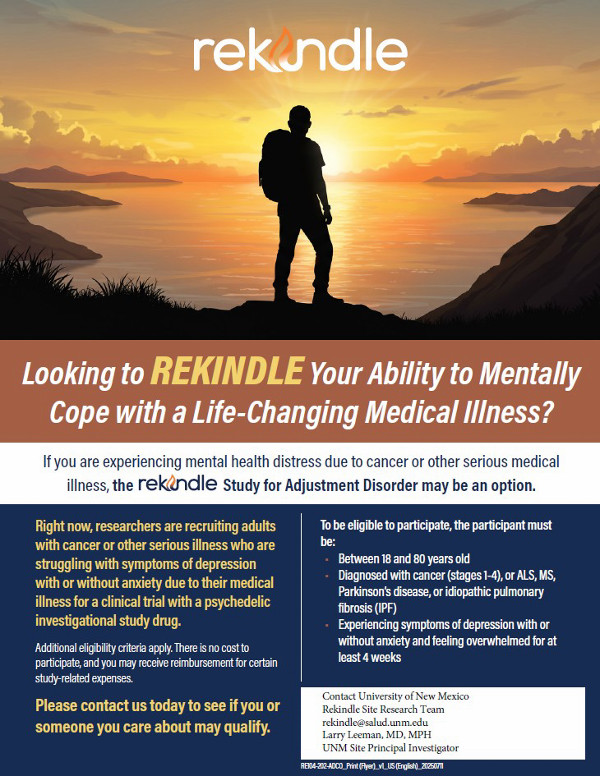
Click HERE to view the full participant brochure
University of New Mexico researchers are joining a multi-site clinical trial of an experimental psychedelic drug intended to alleviate the mental suffering many patients experience when they receive a life-altering disease diagnosis.
The REKINDLE trial will test the effectiveness of RE104, a synthetic “prodrug” that is chemically similar to psilocybin, the active ingredient in so-called magic mushrooms, said study director Lawrence Leeman, MD, MPH, a professor in the Department of Family & Community Medicine in the UNM School of Medicine.
The Phase 2 double-blind placebo-controlled study will recruit patients who have received diagnoses of cancer, amyotrophic lateral sclerosis (ALS), idiopathic pulmonary fibrosis, multiple sclerosis or Parkinson’s disease, conditions that may be terminal or lead to lingering disability.
Patients with diagnoses like these often experience adjustment disorder, characterized by persistent, debilitating anxiety and depression. “Anxiety and depression are common responses to these serious illnesses,” Leeman said. “However, when the responses are prolonged and intense then ‘adjustment disorder’ can be diagnosed.”
Psychedelic therapy holds the potential to lessen the distress experienced by a large number of people with serious medical illness, he said. “If we look at all the different indications for psychedelic therapies, this one may ultimately extend to many people. A challenging experience is common when someone is diagnosed with ALS, Stage 4 cancer, or other serious life-threatening illnesses. Many people will experience this in their lifetime.”
Psilocybin has been shown in previous studies to help people experiencing major depression and anxiety, Leeman said. It is metabolized into psilocin, a molecule that activates 5-HT2A serotonin receptors in brain tissue and induces a period of neuroplasticity that seems to allow people to reframe their difficult experiences and find greater peace of mind.
The drug has little addictive potential and few serious side effects for healthy people, he said. One potential downside to the use of psilocybin to treat people with serious medical illness may be the duration of its psychedelic effects – six to seven hours in most cases, he said. RE104, which is delivered via injection, has a shorter half-life, so that someone could undergo a therapeutic experience in about three hours.
UNM, one of several sites participating in the clinical trial, has previously hosted other studies into the potential use of drugs like psilocybin, MDMA and ketamine to treat mood disorders and addiction, Leeman said.
The research is conducted at the Interdisciplinary Substance Use and Brain Injury Center on UNM’s North Campus, where patients are first screened for a variety of health problems and disqualifying conditions, such as pregnancy and serious mental illness.
After being dosed with psilocybin, people typically don eyeshades and rest quietly while being monitored by a licensed therapist and a trained co-facilitator. Many undergo a transformative mystical experience.
“For most of the session, people are ‘within,’” he said. “There’s not a lot of talking going on. It’s a more internal experience. The word we use in psychedelic therapy for the processing of the experience is ‘integration.’” The study will follow participants for 42 days after the session, evaluating their mood and quality of life.
Leeman is reaching out to oncologists and other specialists who treat patients with life-threatening illnesses to recruit patients. He will begin screening potential study participants later this month.
The new study comes amid growing interest in the potential therapeutic uses of psychedelics like psilocybin and LSD, which in the U.S. are classified as Schedule I drugs under the Controlled Substances Act.
Earlier this year, the New Mexico Legislature approved a measure to allow the therapeutic use of psilocybin for major treatment-resistant depression, post-traumatic stress disorder, substance use disorders and end-of-life care. It could become available through a state-regulated program by the end of 2027, Leeman said.
Should RE104 fulfill its promise, he believes it could be a game-changer for many people as they approach the end of their lives.
“This has the potential to alter the process of death and dying for a lot of people,” he said. “A lot of us would probably agree that the fear of death in our society is very strong and often the way of dying is often very hard. If this is successful, it offers all sorts of different possibilities.
“Right now, the medicalized side of death is basically palliative care, which helps with symptoms. Maybe this is a different way to process your life. I find it really interesting from that point of view.”
Health care providers and those who are interested in participating in the REKINDLE study can email the UNM study team for more information: rekindle@salud.unm.edu


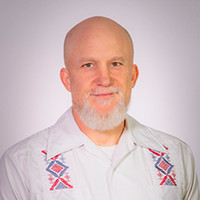
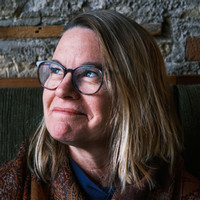
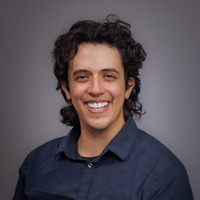
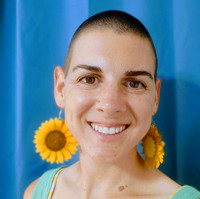

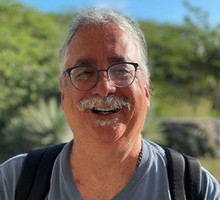
Larry Leeman, MD, MPH
A note of gratitude: The psychedelic assisted therapy approach used by our UNM team has been guided by trainings and mentorship from the California Institute of Integral Studies (CIIS), Psychedelic Research and Training Institute (PRATI), Polaris Insight Center, and the Multidisciplinary Association for Psychedelic Studies (MAPS). We are thankful for their guidance. We extend our homage and gratitude to the indigenous peoples who were the originators and holders of the sacred medicine traditions that inform this work today.
Related Links